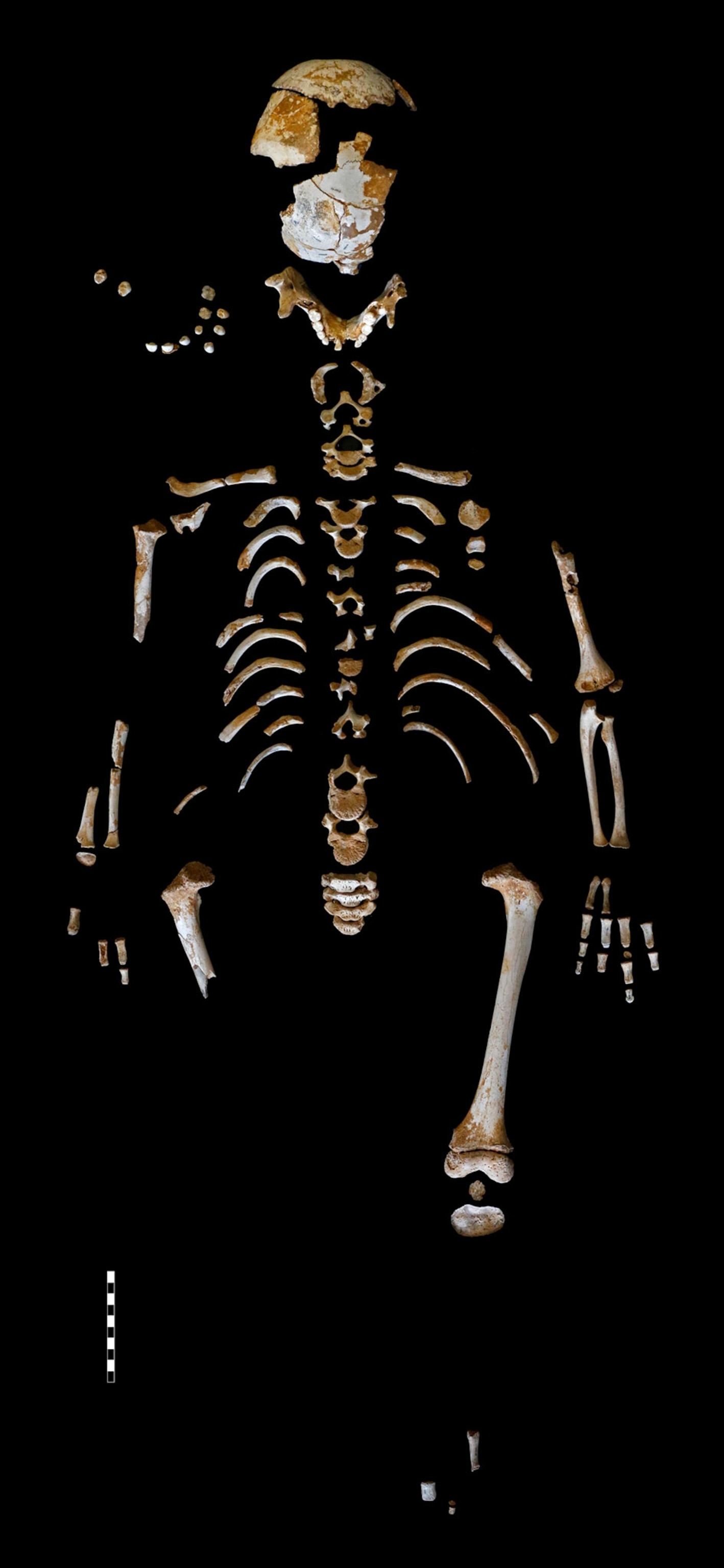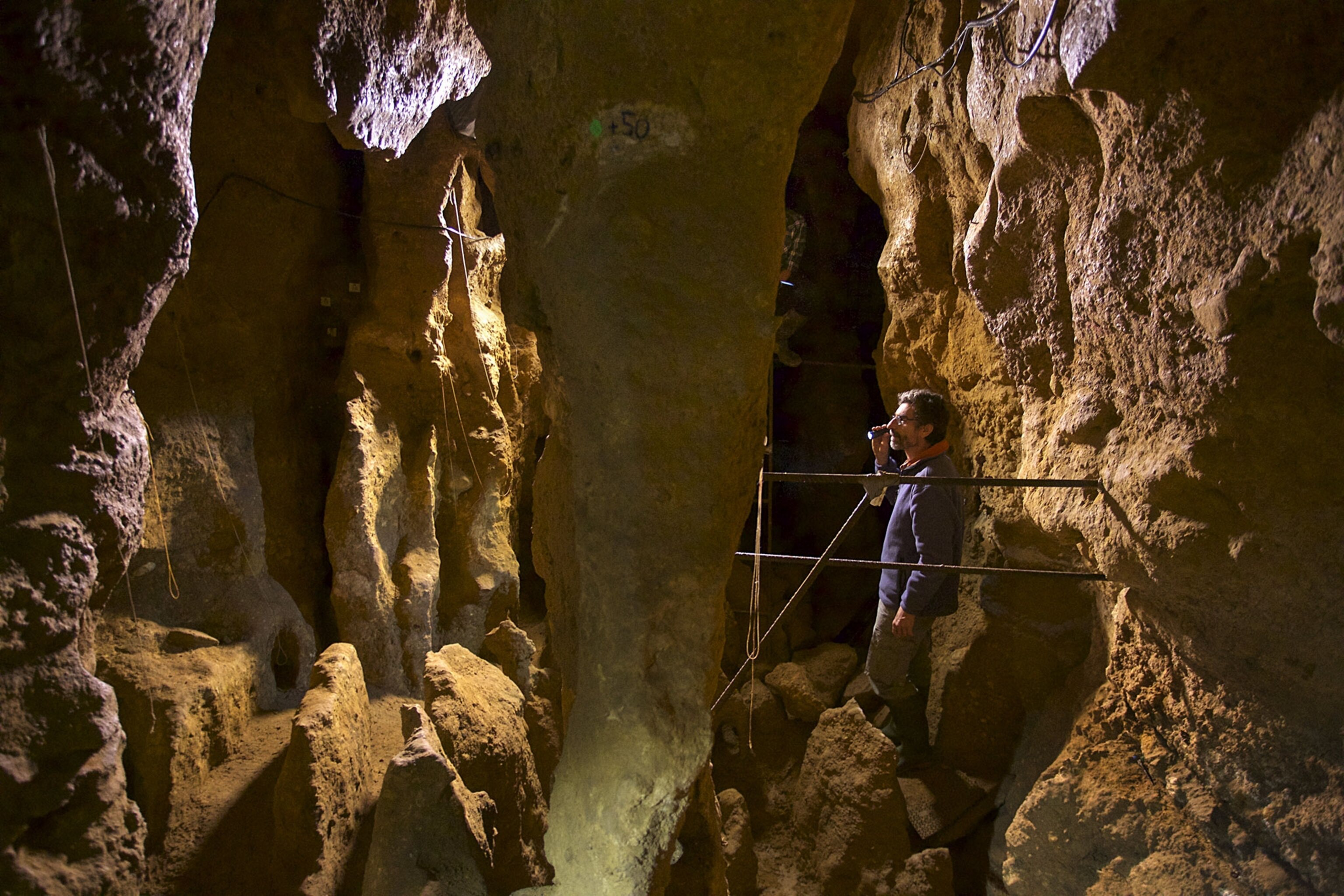
This Neanderthal Child Grew Up Just Like Us
A 49,000-year-old skeleton supports the notion that long childhoods—thought to help nurse a larger brain—aren't unique to Homo sapiens.
Some 49,000 years ago in what's now Spain, a Neanderthal boy died a few months shy of his eighth birthday. Now, scientists have examined his skeleton in detail—and they claim that the boy's growth largely mirrored that of today's human children.
The find, announced on Thursday in the journal Science, adds more evidence to the notion that long, slow development—thought to help to nurse a larger brain—isn't necessarily unique to Homo sapiens.
“We thought that our way of growing was really specific, very particular to our species,” says study leader Antonio Rosas, the chair of paleoanthropology at the National Museum of Natural Sciences in Madrid, Spain. “We realize now that this pattern of slow growth that allows us to have this big brain ... is shared by different human species.”
For more than 200,000 years, Neanderthals fanned out over Europe, at one time stretching from Britain almost to Mongolia. Once stereotyped as strong-browed brutes, our extinct cousins were more likely thoughtful, even sophisticated.
They used fire; they almost certainly buried their dead; and they seem to have self-medicated with local plants and fungi. One recent study also claims that Neanderthals constructed a mysterious stone circle in a French cave, for unknown symbolic reasons.
But for years, debate has raged over whether Neanderthals were also humanlike in their physical development. Did their bodies mature quickly in a developmental “fast lane” that primates such as gorillas employ today? Or did Neanderthals develop in a “slow lane” once thought unique to modern humans?
One of the better places to look for answers is El Sidrón, a cave system in northwestern Spain that contains more than 2,500 Neanderthal remains dated to about 49,000 years ago. Remarkably, the seven adults and six juveniles represented by these bone fragments probably lived within the same social group. (Read more about El Sidrón, one of Neanderthals' last refuges—and the site of an archaeological cold case.)
About a Boy
One of these juveniles, a probable boy known as El Sidrón J1, has a fairly complete skeleton, letting researchers peer into his life and death.
J1 would have stood almost four feet tall and weighed some 57 pounds. He was right-handed, and prior to his death, he had been mimicking his elders: The wear patterns on his teeth imply that like the adults of El Sidrón, he used his mouth as a “third hand” during household tasks.

Maladies hadn't etched any serious illnesses into his skeleton, save for some mildly weakened tooth enamel. However, someone left cut marks on his bones after his death, possible signs of cannibalism. The remains also preserved traces of J1's calendar age, letting Rosas and his team compare it to the boy's skeletal maturity.
As teeth form, the enamel accretes layer by layer, forming lines that scientists can count like tree rings. After examining one of J1's molars that hadn't yet erupted, the researchers estimated that the boy was about 7.7 years old when he died.
When the team then compared J1's skeleton against thousands of modern human children, J1 most closely resembled today's seven- and eight-year-olds. In short, J1 was growing in a manner indistinguishable from today's children.
However, Rosas's team says that his skull differs slightly from modern crania. The skull's inner surface bears signs that the bone may have felt pressure from a growing brain, and his brain size was about 88 percent of the average Neanderthal adult's, lacking about a baseball's worth of volume.
This difference implies that the boy's brain was still growing, the researchers argue. If so, J1's brain development may have been slower than that seen in modern humans, whose brains are fully grown before the age of seven.
A Heady Debate
But not all outside researchers are convinced by Rosas's logic, in part because he's working with a sample size of one.
Paleoanthropologists Marcia Ponce de León and Christoph Zollikofer of the University of Zurich have also argued that Neanderthals had humanlike development. While they applaud the study in general, they say there's no statistical evidence that J1's brain developed slower than a modern human's.
After all, adult Neanderthals didn't have cookie-cutter brains. J1's brain was on the smaller side for adults, but hardly without precedent, Ponce de León and Zollikofer say. Some adult Neanderthals had brains even smaller than J1's—and some Neanderthals younger than J1 had bigger brains.
“While we know El Sidrón’s brain volume at the time of its death, we have no idea about the adult volume that it could have reached,” the two researchers write in a joint email. “However, overall, the paper makes a convincing case for the slow development of the Neanderthals (at least as slow as ours), putting the idea of 'human uniqueness' to a rest!”
Tanya Smith, a Neanderthal-teeth expert with appointments at Harvard and Griffith University, also has her doubts. She says that the researchers' conclusions ultimately hinge on the accuracy of the tooth's age, but their dating method rests on several assumptions. She also agrees with Zollikofer and Ponce de León: Just because J1's brain was below average in size doesn't mean it was still growing.
“I think we know enough about developmental variation within living species to not draw sweeping conclusions from a single fossil,” she says.